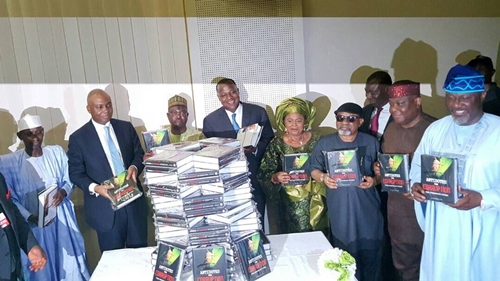Prepositions are really little troublesome words. A wrong use of one is capable of conveying a message different from what the writer or speaker means.
Senator Dino Melaye of Nigeria is a university graduate and holder of a Master’s degree too. He speaks correct English, as evident in his speeches on the floor of the National Assembly. So when some people pointed to a major mistake in the title of his new book, which was presented in Abuja on May 15, the distinguished senator must have had a good laugh.
Antidotes for Corruption. That’s the title of Melaye’s book.
Yes, regular speakers and writers of the English language prefer to say “Antidotes to corruption”, but that’s a choice.
There are indications that Melaye means what the title of his book says. Even before reaching for the content of the book, the reader could assume that he has assembled the antidotes to corruption and then delivered them to corruption itself: the antidotes are for corruption, not for corruption fighters. It therefore doesn’t mean the book contains solutions to corruption in Nigeria.
Daily, Nigerians are regaled with personifications of corruption: “If you fight corruption, corruption fights back.” “Corruption is fighting back”. Senator Melaye has simply collected the antidotes for corruption’s use in the fight – the book is perhaps poison (the opposite of antidote) for the corruption fight in Nigeria.
Meanwhile, some have been mocking the senator because of the calibre of personalities that graced his book launch. Senate president Bukola Saraki wrote the foreword and Patience Jonathan was a guest. So? Melaye must have known that, though many of his guests had corruption cases to answer in the courts, none had been convicted of the crime. That wasn’t a mistake either; he knew what he was doing.
Those who think the book’s title contains an error don’t understand semantics. There are rules for the use of English, but rules are not laws. Or has Melaye apologised? Can anyone sue him? And does it mean he never sought the aid of an editor or a friend who knows English better? Even a 12-year-old would have consulted a good dictionary just before the press rolled.
Likely, he argued with an editor and insisted on having the book’s title as it is. Those who have read the book should know whether the sentences contain errors too. After all, horrible mistakes (even in books, articles, speeches and theses) don’t matter to many Nigerians. They don’t need the services of editors – because everyone can write. When a writer makes a mistake, however, he publishes it for the world to read!











